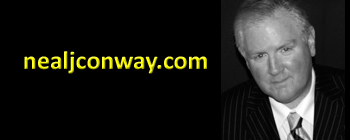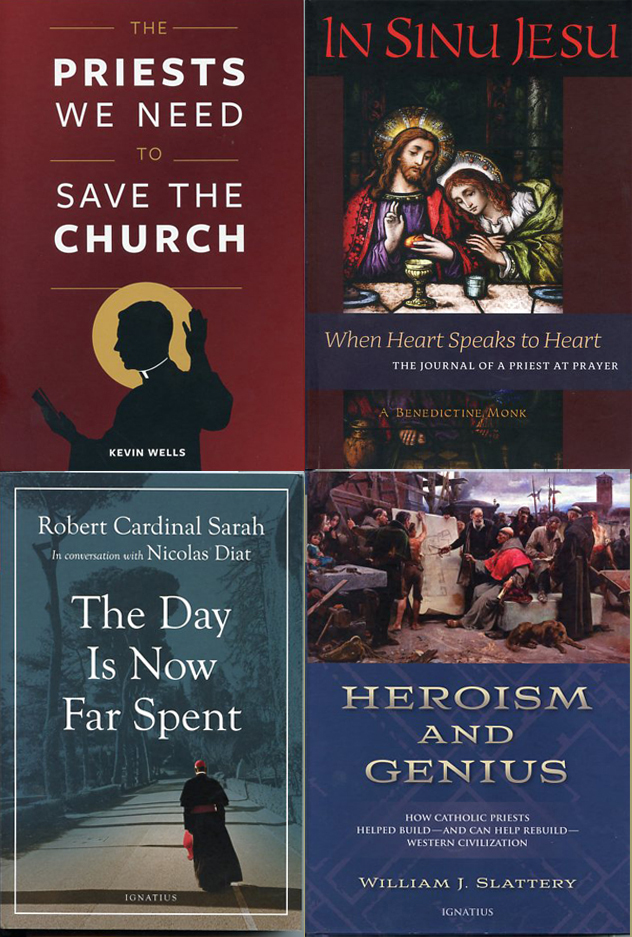CATHOLIC MATTERS
Four Books For Priests
January 1, 2021
The Priests We Need to Save The Church
Kevin Wells
Sophia Institute Press, Manchester, NH, 2019.
A detective investigating the gruesome 2000 murder of Msgr. Thomas Wells said he never saw another Day-Timer like the slain priest's: containing so many penned-in commitments.
One entry in one of Msgr. Wells' calendars surely was the night he came to address a small, faith-sharing group I belonged to. When Msgr. Wells was pastor of Our Lady of Lourdes in Bethesda, Maryland, I occasionally returned to this church of my baptism to attend his Masses.
Quite honestly, I don't remember what Msgr. spoke to our group about. It's my misfortune not to have noticed the special reverence with which he elevated the host at his Masses. That's me, but shortly after Msgr.'s murder I experienced the urge to include him among my intercessors.
Almost 20 years after Msgr. Wells' death his nephew, Kevin Wells, has written the best-selling The Priests We Need to Save The Church, describing his uncle's exemplary qualities as models for all priests.
A newly minted priest and I were discussing the discipline of fasting.
"John Vianney was down to one potato a day!" the young Father contributed with amazement.
"You read Kevin Wells' book!" I said.
I discovered that a man I work with in a very secular media establishment had Msgr. Wells as a spiritual director. Thomas Wells' legacy is everywhere in the Archdiocese of Washington, DC and beyond. Three thousand mourners, including over 250 clergy, some from distant dioceses, attended his funeral.
Swamp Creatures
I and other DC-area Catholics who have read The Priests We Need etc. marvel at how many good priests influenced by Msgr. Wells there are in the Washington archdiocese. We are, in some far-off eyes, all swamp creatures.
One protégé of Msgr.'s discussed in the book is DC Auxiliary Bishop Mario Dorsonville. I have witnessed Bishop Dorsonville preside at Masses preceding Rosary processions to Carhart abortuaries. It is noteworthy when bishops attend prolife events.
Bishop Dorsonville is unabashedly pro-life, yet he has been set down by a blogger as a "pro-death" swamp creature merely because he briefly shared a diocesan-owned residence with departing Theodore McCarrick.
"...[A] priest can never be married," Kevin Wells recalls his uncle telling him, "He's got to be around whenever someone needs him." (p.171)
Availability, "a different form of martyrdom: the daily, unremitting grind of being wholly available for those in need of a priestly presence," (p. 175) is one of Kevin Wells' essentials for priestly excellence.
However the two that I want to highlight in this essay -- You will see why as you read through it -- are 1) spending time before the Blessed Sacrament, aka the Holy Hour, and 2) praying to Mary.
"Mary is the coworker in our ministry," Wells quotes Msgr. Andrew Baker of Mount St. Mary's, "I don't see how a priest could achieve the full fruitfulness of his ministry without a daily Holy Hour and a daily Rosary." (p.110)
Social Justice Catholics, and they sadly include most Baby-Boomer-and-younger graduates of DC-area Catholic schools (many of whom have also graduated from the church), think of the Eucharist as being a quaint, optional extracurricular. They suspect that Catholics who prioritize the Eucharist are really harboring a secret agenda of cutting taxes and food-stamps.
Yet as the Catholic catechism declares, "...all ecclesiastical ministries and works of the apostolate, are bound up with the Eucharist and are oriented toward it. For in the blessed Eucharist is contained the whole spiritual good of the Church, namely Christ himself...."(1)
St. Teresa of Calcutta fits a common conception of what a saint should be, but the focus on her care of the poor overlooks her motivation and source of strength. Mother Teresa had a tabernacle in every one of her institutions.
"He's life-giving and refreshing," one of Wells' interviewed priests say of his Holy Hour before the Eucharist, "It's at Adoration that my priesthood takes its shape." (p.89)
"The strong priest grasps Mary's spiritual motherhood," Wells writes, because of what unfolded in the lonely shadow of the cross, when, between heaving breaths, her dying Son whispered that she protect His beloved apostle. At that moment...Mary hoisted the vocation of the priesthood on her back. After lifting her eyes to receive her Son's final request, she cast them on the beloved apostle, John....Mary became [the priesthood's] safeguard...she began to shape the souls of the many millions of her son's future priests." (p.107).
Fair criticism from a priest of The Priests We Need To Save The Church: 1) Kevin Wells does not include among his numbered-lists of essentials the necessity of priests seeking frequent confession; 2) Not every priest has the personality to be a Msgr. Thomas Wells.
A layman such as Kevin Wells telling priests how to live their vocations may seem to be overstepping bounds, however priests, bishops and even recent great, saintly popes have not decisively dealt with corrupt clergy, with priests and bishops who compromise the faith to avoid offending sinners, or with comfortable-bachelor, maintenance pastors who binge-watch The Baking Show while their congregations die of old age.
Younger priests and bishops, the inspired products of St. John Paul II's and Benedict XVI's seminarial reforms, the subjects of Kevin Wells' book, are on the verge of leadership. However, for the moment -- what seems to be a very protracted moment -- the new generation is barred by an ancienne regime wedded til death do it part to Social Justice, a church cozying up to the World. Moreover, that regime is locked arm-in-arm against reform with some ordained men who are simply plain opportunists and gangsters.
That obstruction can't last forever. In the meantime, get used to laypeople with institutional knowledge and a sound experience of the faith putting in their two cents.
The Day Is Now Far Spent
Robert Cardinal Sarah in conversation with Nicholas Diat
Ignatius Press, San Francisco, 2019
The optimism of the church in the Third Millennium, so marked by St. John Paul II at its beginning, has, over 20 years, receded before gloom. The momentum we experienced during JPII's papacy has stalled.
The light finds old scandals and more recent disgraces. For every person converting to Catholicism, six leave the church. Scientism, a canon of beliefs about "Science" devoutly held by people, including some scientists, who know nothing about real science has made the faith nonsense to young people. Defeatist Catholic pundits moan (I like to imagine in an Eeyore voice): Now we're gonna be persecuted. We're heading for the catacombs.
Yet as we move into the new millennium, with darkness descending, we find -- speaking of laypeople offering counsel, the lights of an astounding number of Catholic intellects -- lay and ordained, men and women, igniting to dispel an encroaching night.
One of these is Robert Cardinal Sarah, a native of Guinea who was taught in his village school that he is French.
"I was able to appreciate the finest fruits of Western Civilization," he says in The Day Is Now Far Spent (p. 242) his third book-length conversation with Nicholas Diat.
Sarah's intellect towers as high as St. John Paul II's and Benedict's. The learning the cardinal manifests in his books is breathtaking, ranging from classical thinkers through the church fathers to modern French authors.
It is a couple of the latter, one being George Bernanos (p.208) who inspires His Eminence's occasional concern about something that 2020s readers may find bizarre: robots. While Artificial Intelligence poses serious ethical problems, Robby is not currently the face of technological advancement hazardous to human dignity.
However very timely in the coronavirus panic is Sarah's diagnosis that his beloved Western Civilization is intent on committing suicide and opening the door to "totalitarian barbarity." He is the rare observer who understands, and is brave enough to say, that Europeans (and Americans) who encourage immigration from Africa and elsewhere are only interested in immigrants as a means of wiping out the civilization that Europeans (and Americans) have built.
Immigration, Sarah laments, not only results in migrants living in poverty, but further destroys the ancient cultures of Africa which face the alternate assault of Westerners smothering them in decadent sewage.
"Jesus loves his fatherland...." the cardinal points out. (p. 312)
Other thoughts, atypical for a modern churchman, from the cardinal include:
"Laypeople...claim a "ministry" at Mass so as to feel that they are taking part... [but Mary and John were silent on Golgotha]." (p. 112) Think about that when lectors switch like sports and weathercasters during the readings and eight Eucharistic ministers slam the altar after the communion antiphon.
"The twelve apostles turned the world upside down. Why are we so preoccupied with the number of priests?" (p.84)
Catholics disgusted with Pope Francis may find it jarring that this extremely orthodox shepherd quotes the feckless, leaky-mouthed pontiff of 2020 along with JPII and BXVI. BXVI is quoted most in all of Sarah's interviews. In 2019 Benedict and Sarah coauthored a book on celibacy. (2) In another volume of his trilogy of talks with Diat, Sarah made a remark about "noisy popes."(3).
"The teachings of the recent popes," Sarah says, "lay the foundations for an authentic priestly spirituality." (p. 301)
Look to the recent popes who have produced the most teachings.
As much as he speaks of what priests must do, Cardinal Sarah discusses what they must avoid:
"We are not commissioned to speak about our feelings." (p. 57)
"[A priest] is not there to invest time in democracy, social justice, ecology, human rights.... (p.62) [However he] must oppose any law against life and family." (p. 51)
"The chief preoccupation of all the disciples of Jesus must be their sanctification," Sarah declares on page 30, "The first place in their lives must be given to prayer, to silent contemplation, and to the Eucharist, without which all the rest would be vain agitation."
"[W]ithout [everyone availing themselves of] regular confession," Sarah warns, "sacramental Communion is in danger of losing its meaning." (p.18)
"A parish in which there is no adoration of the Blessed Sacrament is either a dead parish or a sick one." (p. 329)
Also by Neal J. Conway:
In this volume which focuses on the adoration and imitation of Jesus, Sarah says little about the Blessed Mother. In one passage he points out her (and St. John's) demeanor at the foot of the cross, "silently allowing themselves to be penetrated, imbued and shaped by the mystery of the cross." (p. 112)
Many knowledgeable, orthodox Catholics, including this writer, hope and pray that Robert Sarah, born in 1945, the son of Africa and of Western Civilization will be the next pope, despite his advancing age.
God, of course, has His omniscient view. Cardinal Sarah himself thinks that Benedict XVI is accomplishing more in his retirement as a contemplative than he would as a still-reigning pope. (p. 121)
In Sinu Jesu: When Heart Speaks to Heart--
The Journal of a Priest at Prayer
A Benedictine Monk
Angelico Press, Kettering, OH, 2016
Did Jesus and less frequently, His Blessed Mother really "speak" to, bestow private revelation on, an anonymous Benedictine monk in Ireland during the years 2007-2014?
The Vatican has not officially examined the content of In Sinu Jesu, declaring it "worthy of belief" as it has with Lourdes, Fatima and the analogous diary-recorded Divine Mercy apparitions to St. Faustina Kowalska. However, In Sinu Jesu bears the imprimatur of the bishop of Meath, Ireland. Its censor deputatis who declared that the book contains nothing contrary to the faith is Traditional Catholic theologian Peter Kwasniewski.
"There is nothing new in what I am saying to you," Jesus tells the monk, "but there is much that has been forgotten, cast aside or even refused out of hardness of heart." (p.72)


